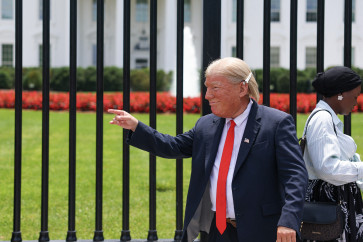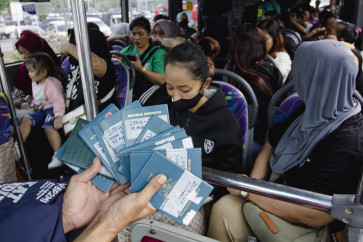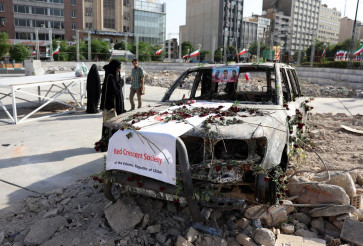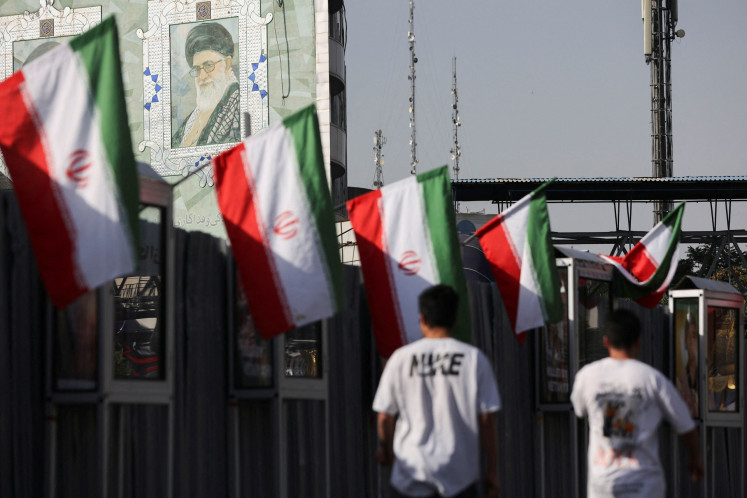Popular Reads
Top Results
Can't find what you're looking for?
View all search resultsPopular Reads
Top Results
Can't find what you're looking for?
View all search resultsKids exposed to hostile, violent messages in Jakarta
Just as Kika Syafii, a resident of Pekayon, Bekasi in West Java, was about to leave for work one morning in March, he found a piece of, folded paper under his fence
Change text size
Gift Premium Articles
to Anyone

J
ust as Kika Syafii, a resident of Pekayon, Bekasi in West Java, was about to leave for work one morning in March, he found a piece of, folded paper under his fence.
At first he thought it was the usual promotional flyer from the nearby minimart. However, to his surprise, the paper contained scribbles of religious slurs and accusations addressed to his 10-year-old daughter. The sender scolded Kika’s daughter for having supported incumbent Jakarta governor candidate Basuki “Ahok” Tjahaja Purnama, who is a Christian of Chinese descent. Kika’s family is Muslim.
“My daughter promptly recognized that the handwriting belonged to her playmate that lives a few blocks away,” Kika said. “My daughter then tried to text her seeking clarification, only to receive a hostile tirade in reply.”
Kika did not see the incident coming since he lived in a suburban housing complex where he rarely interacted with his neighbors.
“The neighbors are good to each other, but we don’t talk too often, because most of us are busy. I’ve never spoken about politics either when I see them [the neighbors],” he said, adding that his daughter did not remember having a political conversation with her playmate.
Kika’s experience is among the regular occurrences faced by people amid the heightened political tensions of the Jakarta gubernatorial election. The Jakarta administration took down more than 1,000 provocative banners exploiting ethnic, religious and racial issues related to the runoff election scheduled for April 19. Hate speech and hostile messages have also circulated among hard-line supporters, exposing young people to hatred on social media.
Some children have been dragged further into the activism arena without being accompanied by their parents.
Rizky Ramadhan, 16, a resident of Cibubur in East Jakarta, invited his friends to participate in a rally to demand the incarceration of Ahok in relation to his blasphemy case on March 31.
Rizky said his parents had given him permission take part in the rally. He said he had also participated in rallies on Nov. 4 and Dec. 2, last year.
Teachers are also reportedly to blame for infusing hatred into their students’ minds.
Asep Saputra, 12, took part in a protest along with his three friends after his religion teacher allowed them to leave school early after encouraging them to participate in the rally.
A children’s rights activist who refused to be named due to the sensitivity of the matter, said her daughter, a fourth grader at a Muslim elementary school in Kebon Jeruk, West Jakarta, became upset after listening to her religion teacher speak to students about the obligation of Muslims to not vote for non-Muslim leaders.
“Some time in January, my daughter texted me while on her way home from school, asking ‘Why is it that my teacher spoke about politics and did not teach us about the subject instead?’,” said the activist.
She calmed her daughter down by explaining that the latter should not pay attention to information that was intended for older people.
“However, when I tried to discuss the problem with another teacher, the teacher only laughed and thought that it [spreading political beliefs to children] was common practice,” she said in disbelief.(dea/kkk)









